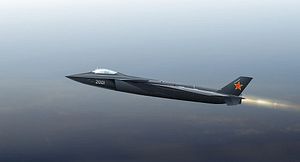The People’s Liberation Army Air Force (PLAAF) has reportedly inducted an unknown number of Chengdu J-20 stealth fighter aircraft, according to the military channel of China Central Television (CCTV) on March 9.
The March 9 CCTV video footage showed a number of J-20 fighter jets flying alongside H-6K long-range bombers, a derivative of the Soviet-era Tupolov Tu-16 twin-engine jet strategic bomber, and Xian Y-20 large military transport aircraft. The television report said that J-20 aircraft participated in exercises with other service branches of the People’s Liberation Army (PLA).
The twin-engine fighter, built by Chengdu Aerospace Corporation, is a single seat stealth fighter likely designed to attack American support aircraft including tankers with Beyond visual range air-to-air missiles (BVRAAM) launched from the aircraft’s internal weapons bay in the event of war.
It is unknown how many J-20 fighter jets have entered service with the PLAAF to date. Estimates vary from six to 12 aircraft. (Other sources indicate eight prototypes and five low rate initial production fighters.) One of the major limitations remains the lack of an advanced Chinese-made jet engine for the fifth-generation warplane.
“There are still a series of technical problems that need to be tackled [on the J-20], including the reliability of its WS-15 engines, [and the plane’s] control system, stealth coat and hull materials and infrared sensor,” a Chinese military source told the South China Morning Post (SCMP).
The domestically developed WS-15 turbofan engine, a thrust engine under development since the 1990s, has not entered serial production. It is assumed that the first patch of J-20s is equipped with an unknown variant of the Saturn AL-31, an older Russian-made jet engine. According to some sources, the J-20 is still purportedly incapable of super cruising — sustained supersonic flight.
A Chinese aviation engineer told China Military Online on March 13 that he remains optimistic that the new engine for the fifth-generation fighter aircraft will be ready soon.“The engine’s development is proceeding well. We also have begun to design a next-generation aviation engine with a thrust-to-weight ratio that is much higher than that of current types,” he said.
Yet, he also admitted to difficulties. “For instance, we are able to develop the two most important components in an advanced engine — the single crystal superalloy turbine blades and powder metallurgy superalloy turbine disks — but in mass production, the products’ quality is not very satisfactory,” he said. “The road to success is filled with setbacks and failures. Each of the world’s engine powers has walked this road.”
It is also unclear whether the J-20 can match the radar-evading capabilities of the Lockheed Martin F-22 Raptor stealth fighter aircraft or the F-35 Lightning II fighter. Given that the aircraft apparently lacks thrust vectoring, it is likely less maneuverable than American-made fifth-generation warplanes.
































